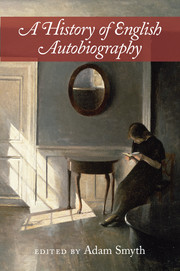Book contents
- Frontmatter
- Dedication
- Contents
- List of contributors
- 1 Introduction: The range, limits, and potentials of the form
- PART 1 AUTOBIOGRAPHY BEFORE ‘AUTOBIOGRAPHY’ (CA. 1300–1700)
- PART 2 RELIGION, GENDER, THINGS (CA. 1700–1800)
- PART 3 THE MANY NINETEENTH CENTURIES (CA. 1800–1900)
- PART 4 RELATIONAL LIVES AND FORMS OF REMEMBERING (CA. 1890–1930)
- 18 ‘Fusions and interrelations’: Family memoirs of Henry James, Edmund Gosse, and others
- 19 Queer lives: Wilde, Sackville-West, and Woolf
- 20 Anecdotal remembrance: Forms of First and Second World War life-writing
- 21 Experiments in form: Modernism and autobiography in Woolf, Eliot, Mansfield, Lawrence, Joyce, and Richardson
- 22 Psychoanalysis and autobiography
- PART 5 KINDS OF COMMUNITY (CA. 1930-CONTEMPORARY)
- Index
- References
20 - Anecdotal remembrance: Forms of First and Second World War life-writing
from PART 4 - RELATIONAL LIVES AND FORMS OF REMEMBERING (CA. 1890–1930)
Published online by Cambridge University Press: 05 March 2016
- Frontmatter
- Dedication
- Contents
- List of contributors
- 1 Introduction: The range, limits, and potentials of the form
- PART 1 AUTOBIOGRAPHY BEFORE ‘AUTOBIOGRAPHY’ (CA. 1300–1700)
- PART 2 RELIGION, GENDER, THINGS (CA. 1700–1800)
- PART 3 THE MANY NINETEENTH CENTURIES (CA. 1800–1900)
- PART 4 RELATIONAL LIVES AND FORMS OF REMEMBERING (CA. 1890–1930)
- 18 ‘Fusions and interrelations’: Family memoirs of Henry James, Edmund Gosse, and others
- 19 Queer lives: Wilde, Sackville-West, and Woolf
- 20 Anecdotal remembrance: Forms of First and Second World War life-writing
- 21 Experiments in form: Modernism and autobiography in Woolf, Eliot, Mansfield, Lawrence, Joyce, and Richardson
- 22 Psychoanalysis and autobiography
- PART 5 KINDS OF COMMUNITY (CA. 1930-CONTEMPORARY)
- Index
- References
Summary
Anecdotes join the conventions, people, and places Robert Graves's autobiography waves goodbye to: ‘No more anecdotes’, he writes in the epilogue of Goodbye to All That (Graves 1929, 448). ‘That’ also includes the First World War. While his book does not focus solely on the war, the war sections are, like the rest of it, markedly anecdotal. It shares this feature with many memoirs and other forms of life-writing associated with both the First and Second World Wars: letters, diaries, and popular anthologies. This chapter will pose three questions of these texts. First: why are they so frequently anecdotal? Second: is there anything wrong with this – might we join Graves in saying ‘no more’? Third: should the popular form be defended? Answers to these questions will problematise easy pairings of ‘war’ and ‘autobiography’, that is, if autobiography is imagined as: ‘An account of a person's life given by himself or herself, esp. one in published book form’ (Oxford English Dictionary 2015). It would be a simplification, this chapter will propose, to attribute the authorship of a war anecdote to ‘a person’. Although it might be argued that the use of ‘I’ is always a fabrication, imposing a false unity upon the subject, the collective weave of war writing is especially evident. War has also complicated the idea of ‘a life’. ‘War narratives aren't like autobiography’, Samuel Hynes reflects: ‘Autobiographies narrate continuous lives; but a war narrative concerns a separate life that, however vividly it remains in the memory, is not continuous with the life the teller lives as he writes’ (Hynes 1997, 8). Anecdotes offer a means of responding to this: the need to narrate the past without providing a sense of sustained development. ‘Autobiographical’ is also tentatively used where war anecdotes are concerned because they do not always give ‘accounts’ of past actions, in the sense of describing events as they happened. ‘Anecdotal evidence’ has become almost a synonym for insubstantial documentary value. In a letter sent to Graves on 7 February 1930, poet and memoirist Siegfried Sassoon wrote: ‘I wished that your anecdotal method had been more accurate’ (Graves 1982, 199). This chapter will not be suggesting that anecdotes do not have documentary bearing; to the contrary, many do. Rather, it will emphasise their additional capacities for different kinds of truth-telling: those that have been associated with fables, folktales, and stories.
- Type
- Chapter
- Information
- A History of English Autobiography , pp. 284 - 297Publisher: Cambridge University PressPrint publication year: 2016



